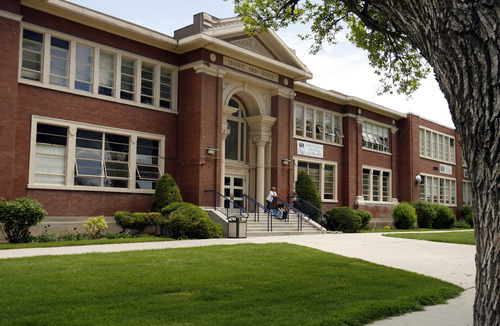This is an archived article that was published on sltrib.com in 2011, and information in the article may be outdated. It is provided only for personal research purposes and may not be reprinted.
South Salt Lake • City efforts to acquire Granite High may not be over, even though Tuesday's official vote canvass narrowed a $25 million bond proposal's margin of defeat by only two votes, to nine.
Councilman Casey Fitts, who led South Salt Lake's pursuit of the venerable high school and its 27 acres, said "it would be irresponsible not to find other ways to see if we can make it happen" after the bond measure fell by a final tally of 1,006 to 997.
That's fine with Drew Rail, spokesman for the group Citizens for a Responsible South Salt Lake, which opposed the bond because of the taxes it would have increased for residents and, even more, businesses.
"If [the city] can obtain Granite through a true partnership with the citizens and businesses, hey, that's fantastic," Rail said. "We're not against Granite. We hope the city finds ways to attract new business. But a tax increase in these economic times was just not something we thought was fiscally responsible."
Fitts said he understood that opposition to a property tax hike (an average of $84 annually for residents, $151 for businesses) beat the bond, not objections to the city's vision of preserving the campus and three of its brick buildings as a community center with classrooms, programs and recreational facilities.
The school has been vacant since its closure in 2009.
On Election Night, the margin of defeat was 11 — 919 to 908. Tuesday's canvass added 176 provisional and absentee ballots to the total, but they were so evenly divided that the deficit barely shrunk.
Richard Scott, the city's bond counsel from Chapman and Cutler, said a recount could be sought if 10 voters filed a request with the city recorder by next Tuesday. The recount, he added, would occur Dec. 2, open to anyone who wanted to observe.
While it's possible there are enough ardent bond supporters in the city to fulfill that requirement, Fitts said he would not publicly encourage a recount. It would be better, he added, to try to figure out another way of obtaining the property, which Granite School District was willing to sell to the city for $8.5 million. The rest of the bond money would have been tapped to earthquake-proof the buildings and make other improvements.
If the city cannot find a way to buy the property, Salt Lake County would have the next option, then the state. If no government entities acquire it, the land and buildings could be sold to a private developer.
Some bond supporters feared the acreage would end up as high-density housing, while opponents argued that moving the property into the private domain would put it on the tax rolls, benefiting the city financially.
City Councilman Mike Rutter, whose easy re-election was affirmed by Tuesday's canvass, said he was disappointed that only 30 percent of South Salt Lake voters cast ballots after city officials spent 18 months studying and holding public meetings about Granite High's future.
"I'd hope the citizens against and for the bond would continue to participate in finding a reuse of Granite High," he said. "It's not doomed. But [the project] may have a different look."
Twitter: @sltribmikeg



